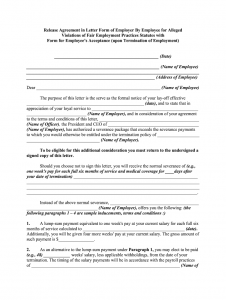Severance and Notice Pay: An Employers’ Guide
Severance and Notice Pay
Employees whose job has been terminated are often offered a severance package, which is an attempt to cushion the blow of losing their employment. The amount of this pay can vary considerably and is typically determined by several factors, including tenure and position in the company. Employees who receive a severance package may also have their remaining benefits (such as health insurance and gym memberships) continued for a period of time.
A severance pay policy is not required by law and the decision to offer it is largely up to the employer, with some exceptions. For example, companies are required to provide advance notice to workers who will be laid off as a result of business closure or mass layoffs in accordance with federal laws known as the Worker Adjustment and Retraining Notification Act and state equivalents.
For this reason, if the company does decide to provide a severance pay package, it must ensure that employees who are dismissed receive the same amount as those who remain. This is accomplished by establishing a severance pay formula, which determines the amount of pay an exiting employee will receive. The formula is typically based on tenure, with higher-ranking executives and those who earn larger salaries receiving more substantial packages.

Severance and Notice Pay: An Employers’ Guide
Many severance pay packages also include a non-compete or non-disclosure agreement that restricts departing employees from seeking out new jobs with competing businesses or speaking badly about their former employers. It is important to note that these agreements are generally enforceable and should be carefully considered before signing.
In addition to a severance package, some employers provide unique benefits to their departing employees, such as reference letters, resume support and interview coaching. This is an excellent way to show the company cares about its employees and tries to make the transition as smooth as possible for those who are leaving.
A severance package can also be used to pay for any expenses the company incurs on behalf of the terminated employee, such as unused vacation or sick days or any other unreimbursed business expenses. This can be a significant expense for the company, which is why some employers may wish to limit the duration and/or geographic area of these expenses, in order to control costs.
While it is important to understand the basics of how to get severance pay, each situation is unique and requires careful consideration by HR professionals. It is therefore crucial to obtain advice from a legal professional experienced in handling these types of issues. Rocket Lawyer, the trusted legal services marketplace, offers affordable access to lawyers who specialize in employment law and can provide personalized guidance for your specific circumstances.
To get started, simply upload your documents to our attorney network. We will match you with a local attorney who can provide you with the advice you need. You can also speak to a lawyer directly by booking an online video consultation with one of our lawyers today. Please note that Rocket Lawyer does not provide legal advice and that you should consult a qualified attorney for assistance with your specific case.